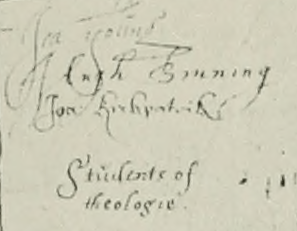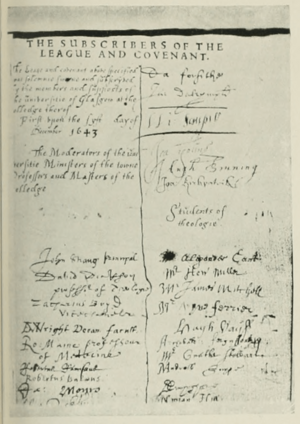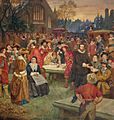Hugh Binning facts for kids
Quick facts for kids Hugh Binning |
|
|---|---|

Hugh Binning's signature from the Solemn League and Covenant (5 December 1643)
|
|
| Church | Govan |
| Predecessor | William Wilkie |
| Successor | David Veitch |
| Orders | |
| Ordination | 8 January 1650 |
| Personal details | |
| Died | September 1653 |
| Denomination | Christian |
| Spouse | Mary Simson |
| Alma mater | University of Glasgow |

Hugh Binning (1627–1653) was a smart Scottish thinker and religious leader. He was born in Scotland when King Charles I ruled. He became a minister in the Presbyterian Church of Scotland. Hugh died in 1653, during the time of Oliver Cromwell and the Commonwealth of England.
Contents
Who was Hugh Binning?
Hugh Binning was the son of John Binning and Margaret M'Kell. Margaret's father and brother were also ministers.
Hugh was born on his family's land in Dalvennan, Straiton, in Ayrshire. His family also owned other lands nearby.
He was a very bright child. He started studying philosophy at the University of Glasgow when he was just thirteen years old. People said he was "an extraordinary instance of precocious learning and genius," meaning he learned very quickly and was super talented.
Hugh Binning's Early Career
In 1645, James Dalrymple, 1st Viscount of Stair, who was Hugh's main teacher, decided to retire. The university looked for a new professor. Hugh was one of three people chosen to compete for the job. Even though he was very young (only 18) and not from a noble family, the other professors strongly supported him.
They suggested the candidates speak without preparing. After hearing Hugh speak, the other candidates gave up. So, Hugh became a professor of philosophy at just 18!
In 1648, at age 21, Hugh became an attorney. That same year, he married Barbara Simpson (sometimes called Mary). Her father was also a minister. Their son, John, was born in 1650.
Hugh became the minister of Govan on October 25, 1649. He was officially ordained on January 8, 1650, at the age of 22. At that time, Govan was a separate town, not part of Glasgow.
Hugh Binning's Death and Legacy
Hugh died around September 1653, when he was only 26 years old. He was buried in the churchyard of Govan. His friend, Patrick Gillespie, who was a leader at the University of Glasgow, put up a monument for him.
The monument's message, roughly translated, says: "Here lies Mr. Hugh Binning, a man known for his faith and great speaking. He was learned in languages, philosophy, and religion. He was a faithful leader and an excellent preacher. He was taken at age 26, in 1653. He changed his society because he walked with God."
Hugh's wife, Barbara (Mary), later married James Gordon, a priest from Ireland.
Hugh's son, John Binning, and his wife Hanna Keir, were Covenanters. This was a group that disagreed with King Charles II. After a battle in 1679, many Covenanters faced harsh punishments. John and Hanna faced many difficulties because of their beliefs.
John Binning later received a small income from his father's writings. He died in England.
Hugh Binning died from a lung disease called consumption. He was very popular as a preacher. People called him "the Scottish Cicero" because he was such a great speaker. All of his writings were published after he died.
What was the Commonwealth Period?
Hugh Binning was born two years after King Charles I became ruler of England, Ireland, and Scotland. Back then, these were separate countries with the same king. Later, Scotland and England joined to form Great Britain.
This time was full of political and religious fights. People argued about whether the king should decide religion or if people should choose for themselves. They also debated how much power the king should have. Could he raise taxes or an army without asking permission? These arguments changed how kings and their people related to each other.
Wars and Changes
In 1638, the Church of Scotland decided to remove bishops and a prayer book that King Charles I had introduced. This led to public riots and a series of wars called the Wars of the Three Kingdoms. These wars happened in England, Scotland, and Ireland.
King Charles I made secret deals with Catholic Ireland and Presbyterian Scotland to invade Anglican England. He promised each country could have its own religion. When the English Parliament found out, they created their own army.
King Charles I was executed in January 1649. This led to Oliver Cromwell taking power and starting the Commonwealth. The wars ended when the monarchy returned, and Charles II became king in 1660.
In Scotland, a law called the Act of Classes was passed in 1649. It stopped people who supported the king (Royalists) from holding government or military jobs. Charles II, who was in exile, signed a treaty with Scotland. This treaty made Presbyterianism the national religion.
However, Scotland was later taken over by England in 1651. Its laws were removed, and Presbyterianism was no longer the official religion. Charles II had to go into exile in France.
Hugh Binning's Stand
The Scottish Parliament later removed the Act of Classes. This caused a split in Scottish society. One side, the Resolutioners, supported the king. The other side, the Protesters, supported Cromwell. Hugh Binning sided with the Protesters.
When Cromwell sent troops to Scotland and tried to change the Church of Scotland, Binning spoke out against it.
In April 1651, Cromwell visited Glasgow. He heard sermons from ministers who criticized him for invading Scotland. That evening, Cromwell invited these ministers to a debate. Hugh Binning was one of the debaters. It is said that he argued so well that he silenced Cromwell's own ministers! Cromwell was very impressed by the "learned and bold young man."
Hugh Binning's Beliefs
Hugh Binning's political ideas came from his religious beliefs. He was a Covenanter, a movement that started in Scotland in 1638. Covenanters signed agreements, like the 1643 Solemn League and Covenant, to protect their reformed religion. Binning was also a "Protester" because of his religious views.
He believed that politics and religion were closely connected. Binning was a Calvinist and followed the teachings of John Knox.
Philosophy and Theology
Binning was trained as a philosopher. He believed that philosophy should serve theology (the study of God). He thought both subjects should be taught together.
His writings, mostly collections of his sermons, are important. They show how philosophy in Scotland was strongly influenced by Calvinism in the 1600s.
Religiously, Hugh Binning was an Evangelical Calvinist. He often spoke about God's great love as the reason for salvation. He believed that "the Father is the very fountain of it, his love is the spring of all."
Binning also believed that God's offer of redemption was for everyone, not just a select few. He taught that "forgiveness is based on Christ's death." He saw Christ's death as a sacrifice that paid for sins.
Hugh Binning's Writings
All of Hugh Binning's works were published after he died. They were mainly collections of his sermons. People said his speaking style was original, imaginative, and simple.
- The Common Principles of the Christian Religion, Clearly Proved, and Singularly Improved; or, A Practical Catechism (1660): This book was an analysis of the Westminster Confession of Faith. It was even translated into Dutch.
* On the love of God: "And what is love but the very motion of the soul to God? And so till it have attained that, to be in him, it can find no place of rest." * On learning: "Be not ignorant as beasts, that know no other things than to follow the drove... You are men, and have reasonable souls within you... Retire once from the multitude, and ask in earnest at God, What is the way?"
- Sinner's Sanctuary (1670): This book contains forty sermons.
- Fellowship with God (1671): This book has twenty-eight sermons.
- Heart Humiliation or Miscellany Sermons (1676): These were sermons preached on different occasions.
- An Useful Case of Conscience (1693): This writing discussed whether Scotland should support King Charles I without limits on his power and without ensuring the Presbyterian religion could be kept. Binning wrote: "Where God hath given us liberty by the law of nature, or his word, no king can justly tie us, and when God binds and obliges us by any of these, no king or parliament can loose or untie us."
- A Treatise of Christian Love: This sermon was based on John 13:35, "By this shall all men know that ye are my disciples, if ye have love one to another." Binning argued that Christians must show love for each other. He wrote: "But Christ’s last words persuade this, that unity in affection is more essential and fundamental. This is the badge he left to his disciples."
In 1735, a collection of Binning's complete works was published. Many editions have been printed since then.
Images for kids
-
Sir James Dalrymple of Stair, a key figure in Scottish law.




